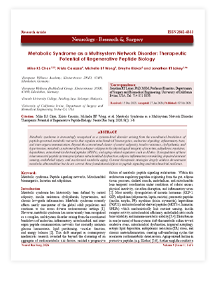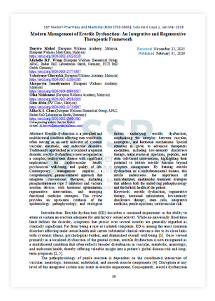Authors: Prof. Dr. Mike K.S. Chan, Krista Casazza, Prof. Dr. Michelle B.F. Wong, Dr. Dmytro…
Peptide Neuromodulation in Autism Spectrum Disorder: Targeting Neuroinflammation, Mitochondrial Dysfunction, and Synaptic Plasticity
💡 About the Article:
Autism Spectrum Disorder (ASD) is a complex neurodevelopmental condition with no FDA-approved treatments targeting its core biological mechanisms. This review explores the promising role of therapeutic peptides in modulating the underlying neurobiology of ASD.
📌 Key Highlights:
✔️ Peptides can cross the blood-brain barrier and target neuroinflammation, synaptic plasticity, and mitochondrial dysfunction
✔️ Mitochondria-derived peptides (MDPs) like Humanin, MOTS-c, and SHLP2 enhance neuronal survival, reduce oxidative stress, and modulate immune responses
✔️ Nano Organo Peptides (NOPs) and Mitochondrial Organelle (MO) Peptides represent next-gen therapies for metabolic restoration, neuroimmune modulation, and synaptic repair
✔️ Clinical studies on peptides like Oxytocin, VIP, Melatonin show early promise in improving social behaviors, sleep, and reducing neuroinflammation in ASD
✔️ Peptide therapies may bridge neurobiology with precision therapeutics, offering a path toward true disease-modifying interventions for ASD
Peptide Neuromodulation in Autism Spectrum Disorder: Targeting Neuroinflammation, Mitochondrial Dysfunction, and Synaptic Plasticity
by
Prof. Dr. Mike K.S. Chan, Prof. Dr. Michelle B.F. Wong, Krista Casazza, Ian Jenkins and Jonathan R.T. Lakey
American Journal of Biomedical Science & Research; 27(2), 2025
https://biomedgrid.com/pdf/AJBSR.MS.ID.003532.pdf
232 Downloads
MORE PUBLICATIONS:
https://european-wellness.eu/publications/


